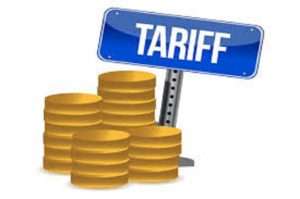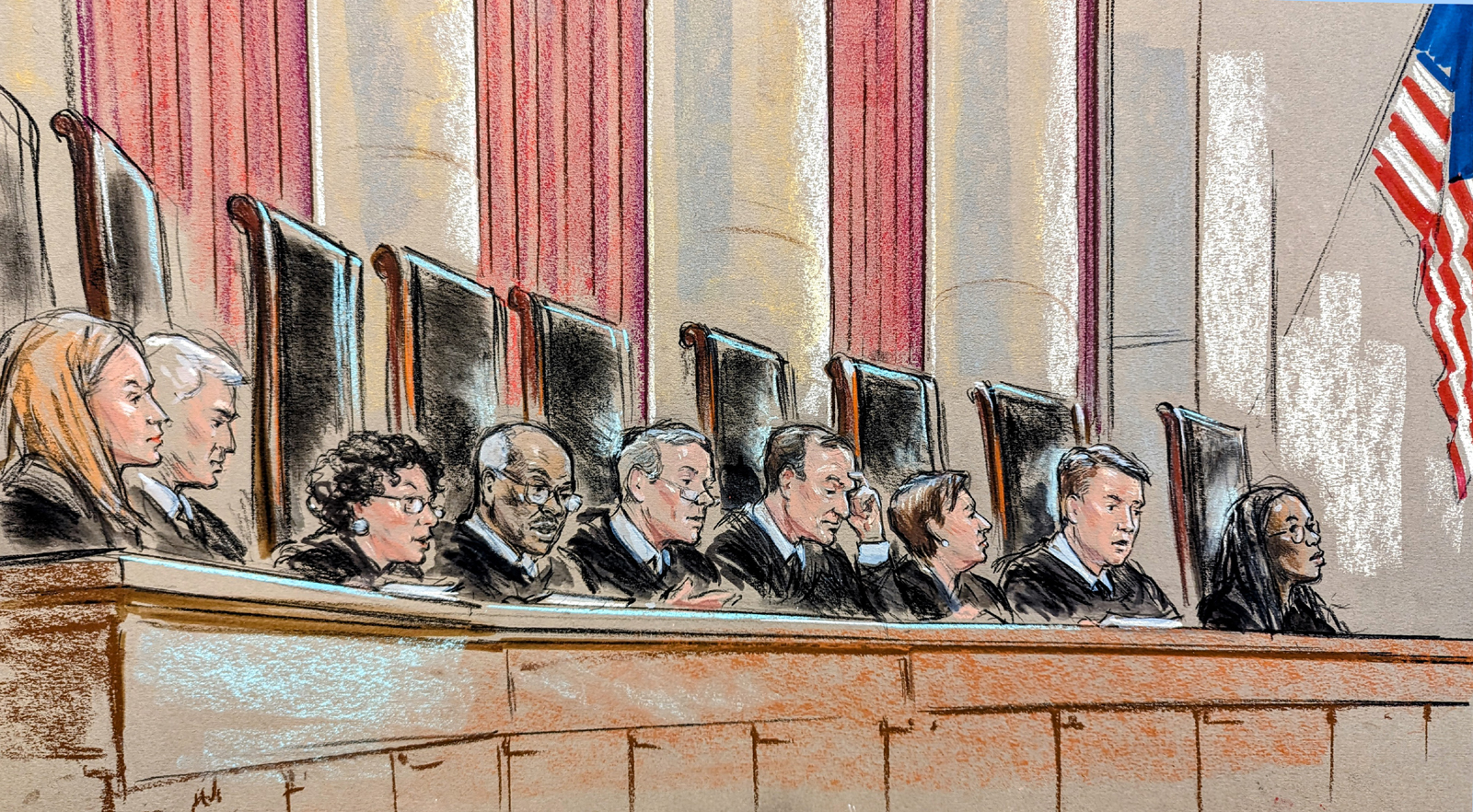
Today the US Court of Appeals for the Federal Circuit ruled against President Trump’s massive “Liberation Day” tariffs in VOS Selections v. Trump, a case filed by Liberty Justice Center and myself on behalf of five small US businesses (we have since been joined by prominent Supreme Court litigators Michael McConnell and Neal Katyal; Neal skillfully conducted the oral argument before the Federal Circuit). The ruling also covers the case filed by twelve states led by Oregon; they prevailed, as well. On these points, a 7-4 majority of the en banc Federal Circuit affirmed the earlier trial court decision issued by the Court of International Trade. The court also remanded the issue of how broad the injunction against the tariffs should be to the Court of International Trade. That litigation is, however, postponed until October 14, to give the government a chance to ask the Supreme Court to review the case.
The majority concluded that the tariffs in question are not authorized by the International Emergency Economic Powers Act of 1977 (IEEPA), and that the major questions doctrine precludes interpreting IEEPA to give the president the virtually unlimited tariff authority he claims.
The majority, concurring and dissenting opinions are 127 pages long, and I will not attempt to cover everything in them here. I will merely highlight some key points.
Here is an excerpt from the per curiam majority decision (issued in the name of all seven majority judges), explaining why IEEPA doesn’t authorize the tariffs imposed by the president:
[I]n each statute delegating tariff power to the President, Congress has provided specific substantive limitations and procedural guidelines to be followed in imposing any such tariffs. It seems unlikely that Congress intended, in enacting IEEPA, to depart from its past practice and grant the President unlimited authority to impose tariffs. The statute neither mentions tariffs (or any of its synonyms) nor has procedural safeguards that contain clear limits on the President’s power to impose tariffs….
[W]henever Congress intends to delegate to the President the authority to impose tariffs, it does so explicitly, either by using unequivocal terms like tariff and duty, or via an overall structure which makes clear that Congress is referring to tariffs. This is no surprise, as the core Congressional power to impose taxes such as tariffs is vested exclusively in the legislative branch by the Constitution; when Congress delegates this power in the first instance, it does so clearly and unambiguously…
Contrary to the Government’s assertion, the mere authorization to “regulate” does not in and of itself imply the authority to impose tariffs. The power to “regulate” has long been understood to be distinct from the power to “tax.” In fact, the Constitution vests these authorities in Congress separately. U.S. Const. art. I, § 8 cl. 1, 3; see also Gibbons v. Ogden, 22 U.S. 1, 201 (1824) (“It is, that all duties, imposts, and excises, shall be uniform. In a separate clause of the enumeration, the power to regulate commerce isgiven, as being entirely distinct from the right to levy taxes and imposts, and as being a new power, not before conferred. The constitution, then, considers these powers assubstantive, and distinct from each other.”); Nat’l Fed’n. of Indep. Bus. v. Sebelius, 567 U.S. 519, 552, 567 (2012) (holding that the individual mandate provision of the PatientProtection and Affordable Care Act was a permissible exercise of Congress’s taxing power but exceeded Congress’s power to regulate commerce). While Congress may use its taxing power in a manner that has a regulatory effect,… the power to tax is not always incident to the power to regulate…
Upon declaring an emergency under IEEPA, a President may, in relevant part, “investigate, block during the pendency of an investigation, regulate, direct and compel, nullify, void, prevent or prohibit” the “importation or exportation of . . . any property in which any foreign country or a national thereof has any interest.” 50 U.S.C. § 1702(a)(1)(B). “Regulate” must be read in the context of these other verbs, none of which involve monetary actions or suggest the power to tax or impose tariffs…
The majority also emphasized that the government’s claim to unlimited tariff authority goes against the major questions doctrine:
The Government’s interpretation of IEEPA as providing the President power to impose unlimited tariffs also runs afoul of the major questions doctrine. See, e.g., Oral Arg.16at 19:28–19:39 (the Government stating “there is no limit on the cap of the tariff in IEEPA itself”). The Supreme Court has explained that the doctrine applies in “cases inwhich the ‘history and the breadth of the authority . . . asserted'” by the Government entails vast “economic and political significance.”West Virginia v. EPA, 597 U.S. 697,721 (2022)…. In such cases, there may be a “‘reason to hesitate before concluding that Congress’ meant to confer such authority.” Id…. When the major questions doctrine isimplicated, the Government must point to “clear congressional authorization” for that asserted power. Id. at 732….
The tariffs at issue in this case implicate the concerns animating the major questions doctrine as they are both “unheralded” and “transformative.” Id. at 722, 724; see alsoid. at 725 (“[J]ust as established practice may shed light on the extent of power conveyed by general statutory language, so the want of assertion of power by those who presumably would be alert to exercise it, is equally significant in determining whether such power was actually conferred.)” ….
Since IEEPA was promulgated almost fifty years ago, past presidents have invoked IEEPA frequently. But not once before has a President asserted his authority under IEEPA to impose tariffs on imports or adjust the rates thereof. Rather, presidents have typically invoked IEEPA to restrict financial transactions with specific countries or entities that the President has determined pose an acute threat to the country’s interests….
Additionally,… tariffs are a core Congressional power. The “basic and consequentialtradeoffs” that are inherent in the President’s decision to mpose the Trafficking and Reciprocal Tariffs “are ones that Congress would likely have intended for itself.” Nebraska, 600 U.S. at 506 (quoting West Virginia, 597 U.S. at 730). Moreover, the United States imports more than $4 trillion of goods annually; these imports account for 14 percent of the nation’s economy. J.A. 215. The Government itself has claimed that the Reciprocal Tariffs will “generate between $2.3 trillion and $3.3 trillion over thebudget window….” The Executive’s use of tariffs qualifies as a decision of vast economic and political significance, so the Government must “point to clearcongressional authorization” for its interpretation of IEEPA. West Virginia, 597 U.S. at 723…
For the reasons discussed above, we discern no clear congressional authorization by IEEPA for tariffs of the magnitude of the Reciprocal Tariffs and Trafficking Tariffs.Reading the phrase “regulate . . . importation” to include imposing these tariffs is “a wafer-thin reed on which to rest such sweeping power.” Ala. Ass’n of Realtors v. Dep’t of Health & Hum. Servs., 594 U.S. 758, 765 (2021)
The majority goes on to reject claims that the major questions doctrine does not apply to delegations to the president (their reasoning is similar to that which I outlined here). It also rejects the argument that the doctrine does not apply because tariffs are a “foreign affairs” power.
The majority did not address whether the government’s claim of unlimited tariff authority would also run afoul of the nondelegation doctrine, which limits the extent to which Congress can delegate legislative authority to the executive. But it does note the significance of the fact that tariffs are a “core congressional power.”
The majority explicitly chose not resolve the issue of whether IEEPA can be used to impose any tariffs at all. But their reasoning suggests either that such imposition is indeed categorically barred, or that any tariff authority that exists under IEEPA is strictly limited.
The concurring opinion, written by Judge Cunningham, on behalf of four judges goes further than the majority. It concludes that IEEPA does not authorize any tariffs at all. It also indicates that the sort of sweeping delegation of tariff authority claimed by the president here is precluded by the nondelegation doctrine, which limits the extent to which Congress can delegate legislative power to the president, relying in part on the Supreme Court’s recent ruling in FCC v. Consumers’ Research (which was helpful to our case in a number of ways):
The Government’s interpretation of IEEPA would render it an unconstitutional delegation. Because taxation authority constitutionally rests with Congress, any delegation of that authority to the President must at least set out an intelligible principle that includes “both ‘the general policy'” that the President “must pursue and ‘the boundaries of [its] delegated authority.'” FCC v. Consumers’ Rsch., 145 S. Ct. 2482, 2497 (2025)… Similarly, Congress must “provide[ ] sufficient standards to enable both ‘the courts and the public [to] ascertain'” whether the President “has followed the law.” Id…. Because this is undoubtedly a case that “affect[s] the entire national economy,” the “‘guidance’ needed is greater . . . than when [Congress] addresses a narrow, technical issue.” Id…. For taxes, both “quantitative” and “qualitative limits on how much money” the President can raise are permissible, but it would “pose a constitutional problem” if the “statute gives the [executive branch] power, all on its own, to raise [a] hypothetical $5 trillion” with no “ceiling.” Id. at 2501–02.
The Government’s interpretation of IEEPA would be a functionally limitless delegation of Congressional taxation authority.
The majority did however vacate the trial court’s universal injunction against the tariffs, and remand the issue of the scope of the injunction to the trial court to determine how broad it should be, in light of the Supreme Court’s recent ruling restricting universal injunctions, in Trump v. CASA. We have a variety of arguments as to why a broad injunction is appropriate in this case, even after CASA (see relevant section of our brief).
The dissent by Judge Taranto, on behalf of himself and three other judges, largely accepts many of the government’s arguments. I won’t go over them in detail here, as this post is already too long. Obviously, I have responded to these arguments in some detail in previous writings, and our legal team also did so in our briefs.
The court has, for the moment, stayed its ruling until October 14, to give the government a chance to ask the Supreme Court to review the decision. We shall see what the justices choose to do.




























